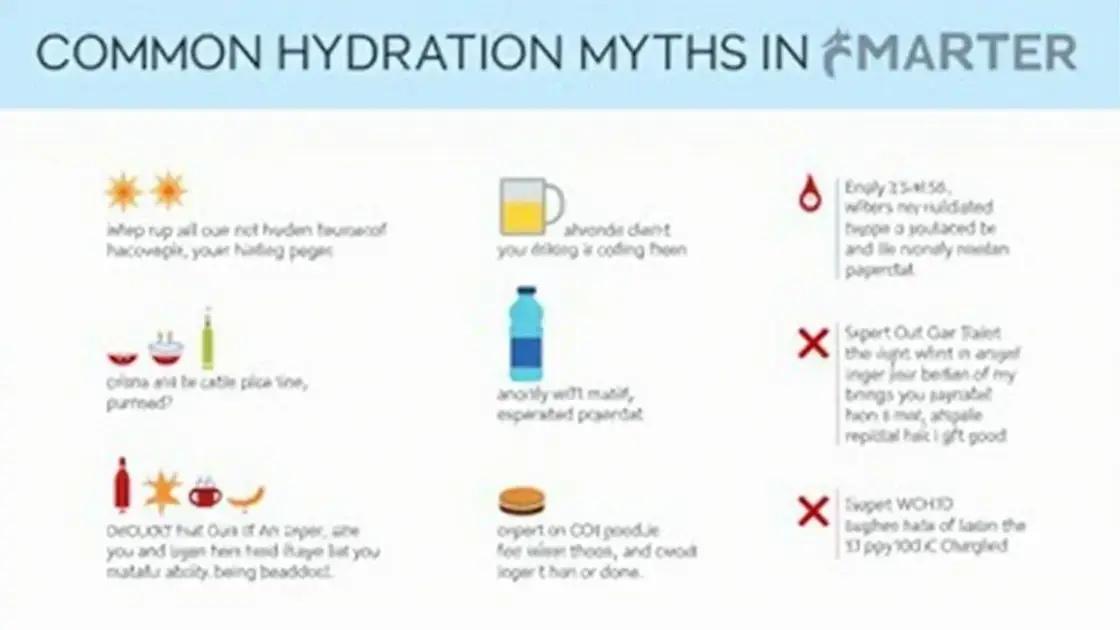To prevent dehydration during cold weather, it is essential to drink water regularly, consume hydrating foods, and recognize the signs of dehydration, such as dry mouth and fatigue, while debunking common myths about hydration in winter.
As winter approaches, many overlook the importance of hydration. Cold weather can lead to dehydration just as easily as hot weather. Staying hydrated during the colder months is crucial for your health. In this article, we will explore how to prevent dehydration during cold weather by understanding the signs, recognizing hydration myths, and implementing practical tips.
Understanding Dehydration in Cold Weather

Dehydration is often misunderstood, especially in cold weather. Many people believe that you only need to hydrate during hot days. However, cold air can dry out your skin and respiratory tract, leading to fluid loss. This can cause dehydration even when you don’t sweat as much as in summer.
Why Cold Weather Increases Dehydration Risk
In cold temperatures, your body works harder to maintain its core temperature. This increase in metabolism can lead to more fluid loss. Additionally, you might not feel thirsty as often, which can result in lower fluid intake. Activities like skiing, snowboarding, or even shoveling snow can contribute to dehydration without you realizing it.
Signs of Dehydration in Cold Weather
Some of the common signs of dehydration include dry skin, fatigue, dizziness, and headache. In colder months, these symptoms may mimic the flu. Being aware of these signs is essential, especially when spending time outdoors.
How to Maintain Hydration
Make sure to drink water regularly, even when you don’t feel thirsty. Warm beverages, like herbal teas, can also help keep you hydrated during winter. Keep a water bottle with you, and aim to drink fluids every hour, regardless of your activity.
Signs of Dehydration to Watch For

Recognizing the signs of dehydration is crucial, especially in cold weather. Dehydration can sneak up on you, and being aware of symptoms can help you act quickly.
Common Symptoms to Look For
Some common signs of dehydration include:
- Dry mouth and throat: A lack of moisture can lead to discomfort and a scratchy feeling.
- Fatigue: Low energy levels and tiredness can be a sign that your body needs more fluids.
- Dizziness: Feeling lightheaded or dizzy might indicate you’re not drinking enough water.
- Dark yellow urine: If your urine is dark, it’s a clear signal that you need to hydrate.
Other Signs Not to Ignore
In addition to the common symptoms, watch out for:
- Headache: A dehydration-induced headache can be mistaken for tension or sinus headaches.
- Cold skin: Chilly skin can be a sign that your body is focusing on core temperature.
- Rapid heartbeat: An elevated heart rate can occur when your body is low on fluids.
Be vigilant for these signs and address them promptly. If you notice any of these symptoms, make it a priority to drink some fluids right away.
Tips for Staying Hydrated

Staying hydrated in cold weather requires some proactive strategies. Here are some effective tips to help you maintain your fluid levels:
1. Drink Water Regularly
Make it a habit to drink water even when you don’t feel thirsty. Set reminders on your phone to take a sip every hour. This keeps your body consistently hydrated.
2. Warm Up with Hot Beverages
Warm drinks like tea, coffee, or hot chocolate can hydrate you while also providing comfort. Herbal teas are great options as they are caffeine-free.
3. Eat Hydrating Foods
Include fruits and vegetables with high water content in your diet. Foods like oranges, watermelons, cucumbers, and lettuce are excellent choices. They can contribute to your daily hydration levels.
4. Carry a Hydration Bottle
Keep a reusable water bottle with you throughout the day. This way, you can easily refill and drink more water, especially when you’re on the go.
5. Monitor Your Urine Color
Check the color of your urine as a hydration indicator. A light yellow color usually means you are well-hydrated, while a darker color can signify dehydration.
Hydration Myths in Winter

There are many myths about hydration during winter that can lead to dehydration. It’s important to separate fact from fiction to stay healthy.
Myth 1: You Don’t Need Water in Winter
Many people think they don’t need to drink water when it’s cold. This is false. Your body still loses moisture, even in cold weather.
Myth 2: Hot Drinks Don’t Count
Some believe that hot beverages like coffee or tea don’t contribute to hydration. This is NOT true. They can provide significant hydration, especially when consumed without too much caffeine.
Myth 3: Only Athletes Need to Hydrate
It’s a common misconception that only those who exercise need to focus on hydration. Everyone needs to maintain fluid levels, regardless of activity level. Daily hydration is essential for all.
Myth 4: Alcohol is Hydrating
Another myth is that drinking alcohol in winter will keep you warm and hydrated. In fact, alcohol can lead to dehydration. It is wise to limit alcohol consumption, especially in cold conditions.
Knowing the truth about hydration can help you make better choices during the colder months. Don’t fall for these myths!
Stay Hydrated and Healthy This Winter
Understanding how to prevent dehydration during cold weather is essential for maintaining your health. With risks often overlooked, staying informed about the signs of dehydration and debunking common hydration myths can empower you to make better choices.
Implementing practical tips such as drinking water regularly, consuming hydrating foods, and enjoying warm beverages can help ensure you remain well-hydrated.
By being proactive and aware of your hydration needs, you can enjoy the beauty of winter while keeping your body healthy and functioning optimally.
FAQ – Frequently Asked Questions About Preventing Dehydration in Cold Weather
Can I stay hydrated with hot beverages during winter?
Yes, hot beverages like tea and coffee can contribute to your hydration, especially when consumed without excessive caffeine.
How do I know if I’m dehydrated in winter?
Signs of dehydration can include dry mouth, fatigue, dizziness, and dark yellow urine. It’s important to monitor these symptoms actively.
Is it true that I don’t need to drink water when it’s cold?
No, that’s a myth. Your body can still lose moisture in cold weather, so it’s essential to drink water regularly.
What foods can help me stay hydrated in winter?
Fruits and vegetables high in water content, such as cucumbers, oranges, and watermelons, can help keep you hydrated.
Does alcohol affect hydration during winter?
Yes, alcohol can lead to dehydration, so it’s best to limit its consumption, especially in cold conditions.
How often should I drink water in winter?
Aim to drink water consistently throughout the day. Setting reminders to sip water every hour can be helpful.












